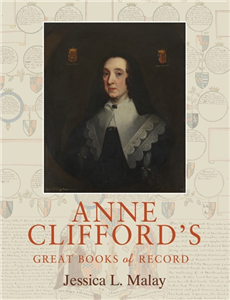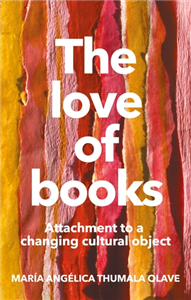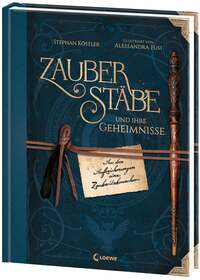Your Search Results
-
Tuti Books
TUTI Books is among the handful of publishers in Iran which are active internationally and has sold its translation rights in many languages. It has won national and international awards including the BIB Grand Prix award in 2019.
View Rights Portal
-
Promoted ContentGenealogy, heraldry, names & honoursMay 2015
Anne Clifford's Great Books of Record
by Jessica L. Malay
In her Great Books of Record Anne Clifford places herself within the dynamic history of the ancient Clifford family, providing an unbroken view into medieval and early modern life for nearly six centuries. In this annotated edition, we glimpse the lives of simple widows, traders, farmers, and labourers juxtaposed with the adventures of soldiers, lords and ladies, princes and princesses. Throughout, Anne Clifford asserts the centrality of women to the success of noble families, including the monarchy. Her Great Books draws upon medieval traditions and early modern scholarship and builds upon these through biographies of the Clifford lords and ladies, along with an extended biography of her mother Margaret Russell and her own autobiographical 'Life of Mee'. Those interested in the lives of medieval and early modern women, changes in culture, the effect of the political upon individuals, and the inspiring life of Anne Clifford will find this a rich and rewarding book.
-
Promoted ContentTechnology, Engineering & AgricultureMarch 1905
The First Book of Farming
by Charles L. Goodrich
This book is a result of the author's search for these facts and truths as a student and farmer and his endeavor as a teacher to present them in a simple manner to others. The object in presenting the book to the general public is the hope that it may be of assistance to farmers, students and teachers, in their search for the fundamental truths and principles of farming.
-
 Trusted Partner
Humanities & Social SciencesMarch 2026
Trusted Partner
Humanities & Social SciencesMarch 2026The love of books
Attachment to a changing cultural object
by María Angélica Thumala Olave
The Love of Books examines the affective bond between people and books in the UK. In the context of the unprecedented abundance of media offering information, storytelling and entertainment, it investigates the attachment to print and digital books amongst readers from a range of backgrounds who read for pleasure, wish to be surrounded by print copies of books, and have trouble discarding books. Unlike existing research, which focuses on prestige, social status, and cultural capital, this study centres on meaning, materiality and emotion. Drawing on interviews and archive material, it shows how attachment emerges from the practical fusion of three elements that have so far been examined separately: the material, surface properties of books, the act of reading, and books' symbolic power.
-
 Trusted Partner
Trusted Partner
-
 Trusted Partner
Trusted Partner
-
 Trusted Partner
Trusted Partner
-
 Trusted Partner
June 2017
Trusted Partner
June 2017Yummy Books!
In 50 Rezepten durch die Weltliteratur
by Cara Nicoletti, Tanja Handels, Susanne Kammerer
Cara Nicoletti liebt zwei Dinge im Leben: Lesen und Kochen. Warum also nicht beides vereinen? Denn Nicoletti ist nicht nur Konditorin, Köchin und die mit Sicherheit charmanteste Metzgerin in ganz Brooklyn, sondern auch ein ausgesprochener Bücherwurm. Wer könnte also besser die beiden schönsten Dinge im Leben zusammenbringen als diese hungrige Leserin? Angefangen hat alles in der Fleischerei des Großvaters in Boston, Massachusetts, in der Cara bereits als Mädchen stapelweise Bücher verschlang. Später zog es sie nach New York, wo sie zwischen dem Bücherwälzen fürs Literaturstudium und der Arbeit in Brooklyns bekanntester Metzgerei schließlich auf die Idee kam, aus ihrer Doppelleidenschaft eine einzige zu machen – indem sie die kulinarischen Passagen ihrer Lieblingsbücher nacherzählte und die besten Rezepte kurzerhand nachkochte. Von Pippi Langstrumpfs »Buttermilchpfannkuchen« über das »perfekt gekochte Ei« von Jane Austen bis hin zu Jonathan Franzens »Schokoladen-Cupcakes mit Pfefferminz-Buttercreme« – Nicoletti lässt uns nicht nur das Wasser im Munde zusammenlaufen, sondern verführt uns auch zum Nachlesen und Nachkochen. Ein perfektes Geschenk für Lesewütige und ein Buch, das rundum glücklich macht.
-
The ArtsMarch 1905
Concerning the Spiritual in Art
by Wassily Kandinsky
A pioneering work in the movement to free art from its traditional bonds to material reality, this book is one of the most important documents in the history of modern art. Written by the famous nonobjective painter Wassily Kandinsky (1866–1944), it explains Kandinsky's own theory of painting and crystallizes the ideas that were influencing many other modern artists of the period. Along with his own groundbreaking paintings, this book had a tremendous impact on the development of modern art. Kandinsky's ideas are presented in two parts. The first part, called "About General Aesthetic," issues a call for a spiritual revolution in painting that will let artists express their own inner lives in abstract, non-material terms. Just as musicians do not depend upon the material world for their music, so artists should not have to depend upon the material world for their art. In the second part, "About Painting," Kandinsky discusses the psychology of colors, the language of form and color, and the responsibilities of the artist. An Introduction by the translator, Michael T. H. Sadler, offers additional explanation of Kandinsky's art and theories, while a new Preface by Richard Stratton discusses Kandinsky's career as a whole and the impact of the book. Making the book even more valuable are nine woodcuts by Kandinsky himself that appear at the chapter headings. This English translation of Über das Geistige in der Kunst was a significant contribution to the understanding of nonobjectivism in art. It continues to be a stimulating and necessary reading experience for every artist, art student, and art patron concerned with the direction of 20th-century painting.
-
The ArtsJanuary 1905
The Elements of Drawing
by John Ruskin
Can drawing — sound, honest representation of the world as the eye sees it, not tricks with the pencil or a few "effects" — be learned from a book? One of the most gifted draftsmen, who is also one of the greatest art critics and theorists of all time, answers that question with a decided "Yes." He is John Ruskin, the author of this book, a classic in art education as well as a highly effective text for the student and amateur today. The work is in three parts, cast in the form of letters to a student, successively covering "First Practice," "Sketching from Nature," and "Colour and Composition." Starting with the bare fundamentals (what kind of drawing pen to buy; shading a square evenly), and using the extremely practical method of exercises which the student performs from the very first, Ruskin instructs, advises, guides, counsels, and anticipates problems with sensitivity. The exercises become more difficult, developing greater and greater skills until Ruskin feels his reader is ready for watercolors and finally composition, which he treats in detail as to the laws of principality, repetition, continuity, curvature, radiation, contrast, interchange, consistency, and harmony. All along the way, Ruskin explains, in plain, clear language, the artistic and craftsmanlike reasons behind his practical advice — underlying which, of course, is Ruskin's brilliant philosophy of honest, naturally observed art which has so much affected our aesthetic. Three full-page plates and 48 woodcuts and diagrams (the latter from drawings by the author) show the student what the text describes. An appendix devotes many pages to the art works which may be studied with profit.
-
PoetryJuly 1904
Paradise Lost
by John Milton
Paradise Lost is an epic poem in blank verse by the 17th-century English poet John Milton. The first version, published in 1667, consisted of ten books with over ten thousand lines of verse. A second edition followed in 1674, arranged into twelve books (in the manner of Virgil's Aeneid) with minor revisions throughout and a note on the versification. The poem concerns the biblical story of the Fall of Man: the temptation of Adam and Eve by the fallen angel Satan and their expulsion from the Garden of Eden. Milton's purpose, stated in Book I, is to "justify the ways of God to men".
-
Lifestyle, Sport & LeisureMarch 1905
How to Cook Fish
by Myrtle Reed
This book is a collection of recipes for fish cooking.
-
Health & Personal DevelopmentMarch 1905
Ginseng and Other Medicinal Plants
by A. R. Harding
This book is made up largely from the experiences of hunters and trappers who have dug "seng" and "seal" and who know much of their peculiarities, and scores are now successful growers.In adidtion to Ginseng and Golden Seal nearly 50 other medicinal plants are described--habits, range, price, uses, etc.
-
Biography & True StoriesMarch 1905
Alaska Days with John Muir
by Samuel Hall Young
Samuel Hall Young, a Presbyterian clergyman, met John Muir when the great naturalist's steamboat docked at Fort Wrangell, in southeastern Alaska, where Young was a missionary to the Stickeen Indians. In "Alaska Days With John Muir" he describes this 1879 meeting: "A hearty grip of the hand and we seemed to coalesce in a friendship which, to me at least, has been one of the very best things in a life full of blessings." This book, first published in 1915, describes two journeys of discovery taken in company with Muir in 1879 and 1880. Despite the pleas of his missionary colleagues that he not risk life and limb with "that wild Muir," Young accompanied Muir in the exploration of Glacier Bay. Upon Muir's return to Alaska in 1880, they traveled together and mapped the inside route to Sitka. Young describes Muir's ability to "slide" up glaciers, the broad Scotch he used when he was enjoying himself, and his natural affinity for Indian wisdom and theistic religion. From the gripping account of their near-disastrous ascent of Glenora Peak to Young's perspective on Muir's famous dog story "Stickeen," Alaska Days is an engaging record of a friendship grounded in the shared wonders of Alaska's wild landscapes.
-
 Trusted Partner
Trusted Partner
-
Business, Economics & LawApril 1905
The Acquisitive Society
by R.H. Tawney
This 1926 survey, written by a distinguished social and economic historian, examines the role of religion in the rise of capitalism. Arguing that material acquisitiveness is morally wrong and a corrupting social influence, the author draws upon his profound knowledge of labor and politics to show how concentrated wealth distorts economic policies. Colorful but credible, this study offers a timeless vision of alternative means toward a just economic, social, and intellectual order.
-
 Trusted Partner
Business, Economics & LawOctober 2023
Trusted Partner
Business, Economics & LawOctober 2023The Island Book of Records Volume I
1959-68
by Neil Storey
The Island Book of Records brings the early years of this iconic record label to life. A fifteen-year labour of love, the volumes will fully document the analogue era of Island. Offering a comprehensive archive of album cover design and photography, together with the voices of the musicians, designers, photographers, producers, studio engineers and record company personnel that worked on each project, the volumes show in unique depth the workings of the label, covering every LP. Featuring material from recent interviews and from media interviews of the time, and each including a comprehensive discography of 45s, the books are lavishly illustrated with gig adverts (very many at venues which no longer exist), concert tickets, flyers, international LP variants, labels, LP and 45 adverts and other ephemera. These LP-sized editions are a collector's dream, offering a truly unparalleled resource for those interested in music history and a perfect gift for any music lover.
-
 Trusted Partner
March 1993
Trusted Partner
March 1993Der Berg des bösen Rates
by Amos Oz, Ruth Achlama
Amos Oz richtet in der 1976 entstandenen Erzählung Der Berg des bösen Rates sein Augenmerk auf die Zeit unmittelbar vor der Gründung des Staates Israel. Im Mai 1946 werden der aus Schlesien 1932 nach Palästina eingewanderte Veterinärmediziner Hans Kipnis und seine aus Warschau stammende Frau Ruth zu einem Ball im Palast des Britischen Hochkommissars für Palästina eingeladen. Beide nehmen die Einladung zu dem Fest auf dem Berg des bösen Rates an, und im Verlaufe des Abends treffen beide eine existentielle Entscheidung - eine Entscheidung, die Ausdruck ihrer Elinstellung zu der sich abzeichnenden Gründung des Staates Israel ist. In dieser vielstimmigen, nach dem klassischen Muster der Novelle komponierten Erzählung ruft Amos Oz die unterschiedlichen Erwartungen der europäischen Einwanderer in Palästina vor der Gründung des Staates Israel in Erinnerung.
-
 Trusted Partner
Trusted Partner
-
 Trusted Partner
Literature & Literary StudiesJanuary 2025
Trusted Partner
Literature & Literary StudiesJanuary 2025People and piety
Protestant devotional identities in early modern England
by Elizabeth Clarke, Robert W. Daniel
This international and interdisciplinary volume investigates Protestant devotional identities in sixteenth- and seventeenth-century England. Divided into two sections, the book examines the 'sites' where these identities were forged - the academy, printing house, household, theatre and prison - and the 'types' of texts that expressed them - spiritual autobiographies, religious poetry and writings tied to the ars moriendi - providing a broad analysis of social, material and literary forms of devotion during England's Long Reformation. Through archival and cutting-edge research, a detailed picture of 'lived religion' emerges, which re-evaluates the pietistic acts and attitudes of well-known and recently discovered figures. To those studying and teaching religion and identity in early modern England, and anyone interested in the history of religious self-expression, these chapters offer a rich and rewarding read.
-
 Trusted Partner
September 2025
Trusted Partner
September 2025Zauberstäbe und ihre Geheimnisse
Aus den Aufzeichnungen eines Zauberstabmachers - Lass dich durch diesen aufwendig gestalteten magischen Bildband in die Welt der Magie entführen! - Das perfekte Geschenk für alle Harry Potter-Fans
by Stephan Köstler, Alessandra Fusi
„Die Faszination an der Zauberstabmacherei ist es, etwas Unmögliches herzustellen, etwas Magisches.“ Die Holzdielen knarren, in der Luft hängt der Geruch von frisch gesägtem Holz und überall liegen Werkzeuge herum: Willkommen in der Werkstatt eines echten Zauberstabmachers! Doch wie wird man eigentlich Zauberstabmacher und was braucht es, damit Zauberstäbe Magie wirken können? Begeben wir uns auf eine magische Reise und finden es heraus … Magische Lesestunden garantiert für alle Hexen und Zauberer zwischen 9 und 99 Authentischer Bericht eines echten Zauberstabmachers Das perfekte Geschenk für Fans von Harry Potter und Magie Zum Schmökern und Entdecken: Qualitytime für die ganze Familie garantiert Prächtige Gestaltung mit farbigen Bildern und Fotos Mit Fotos aus der realen Werkstatt des Meisters Hochwertiges Coffeetable-Book mit besonderer Ausstattung : Halbleinen , Goldfolie und zwei Panoramaseiten zum Ausklappen Geschenkbuch mit „Schatzkästchen“-Charakter Autor Stephan Köstler ist der Besitzer des weltweit erfolgreichen Etsy-Shops „ Koestler’s Fine Wands “ Zauberhafte Illustrationen von Alessandra Fusi


































